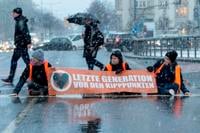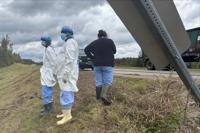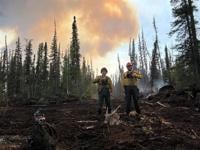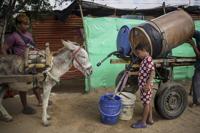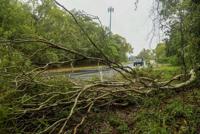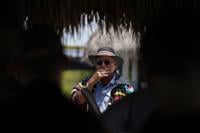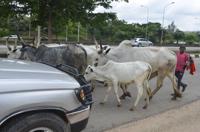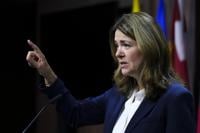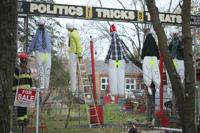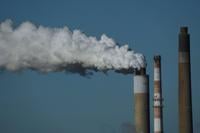BRUSSELS (AP) — The European Union is attempting to forge new climate goals on Tuesday before the U.N. climate talks in Brazil.
Ministers from across the 27-nation bloc met in Brussels to try to get at least 15 to align their nationally determined emissions targets to have a stronger negotiating position during the Conference of Parties — known less formally as COP30 in Belem.
“We need to show to the world that we are leaders in climate change. We need to deliver adequate signals for investors. Today’s the day," Spanish climate minister Sara Aagesen said before the meeting.
A draft proposal for an agreement on climate commitments seen by The Associated Press calls for loosening core climate regulations by giving priority to economic and energy security.
Climate ministers will discuss the proposal, which would allow nations to swap emissions between domestic economic sectors like manufacturing and agriculture. It also calls for larger allowances for EU nations to buy carbon credits outside the bloc.
The EU's long-held leadership of action on climate is under threat by domestic and international pressure.
Wildfires, heat waves and floods have disrupted life across Europe, spurring calls for more climate action. But crises like Russia's war in Ukraine, and a newly volatile relationship with the United States, have increased political and economic pressure to curtail flagship environmental policies.
A recent weakening of a deforestation law by the European Commission, the EU's executive arm, upset environmentalists. They worried that it signaled a deeper disenchantment with green priorities by European Commission President Ursula von der Leyen. In February, she had announced an that some said eroded her Green Deal, a plan aimed at making Europe the world’s first carbon-neutral continent.
But von der Leyen said in September that “the world can count on Europe’s climate leadership” and pledged that the EU is “on our way to climate neutrality” and would slash carbon emissions by 90% by 2040.
She has linked climate investment to sovereignty and defense, arguing that a self-reliant Europe can better face threats like disruptive tariffs or export controls, armed conflict and environmental disasters.
Many EU governments have shifted to the right since the Paris Agreement in 2015. Some see climate regulations as shackling the economy, while others say Europe will either make and sell renewables or be forced to buy energy or green products from countries like China.
Wopke Hoekstra, the EU's climate commissioner, said that the bloc needed to “bridge climate action with competitiveness and industrial savviness, if you will, and independence that is going to be the name of the game in the years that we have ahead of us.”
“We’ll do our utmost to be successful, but it takes 27 to tango,” he said of the negotiations on Tuesday.
The from the Paris Agreement and set back its climate goals has rattled Europe, whose climate vision was in part forged in partnership with the Democratic administrations of former U.S. Presidents Barack Obama and Joe Biden.
aims to keep average global temperature from rising beyond 2 degrees Celsius (3.6 degrees Fahrenheit), and ideally limit it to 1.5 degrees Celsius (2.7 degrees Fahrenheit), compared to the 1850s. To do that, the agreement says nations must slash planet-warming pollution that results when coal, oil and gas are burned.
The EU's commitments in Paris have driven investment in renewable energies and electric vehicles, often and .
Heat-trapping in the atmosphere jumped by the highest amount on record last year, soaring to a height not seen in human civilization and “turbocharging” the and causing more extreme weather, according to the U.N. weather agency.
Europe is and has been twice as fast as other regions since the 1980s. The heat has been linked to more intense rains and floods, and the report predicts rainfall decline and more severe droughts in southern Europe.
“Today is about the level of ambition, and it’s about standing ground and not only sticking to talking the talk when it is easy, but also walking the walk when it becomes difficult,” Swedish climate minister Romina Pourmokhtari said in Brussels.




